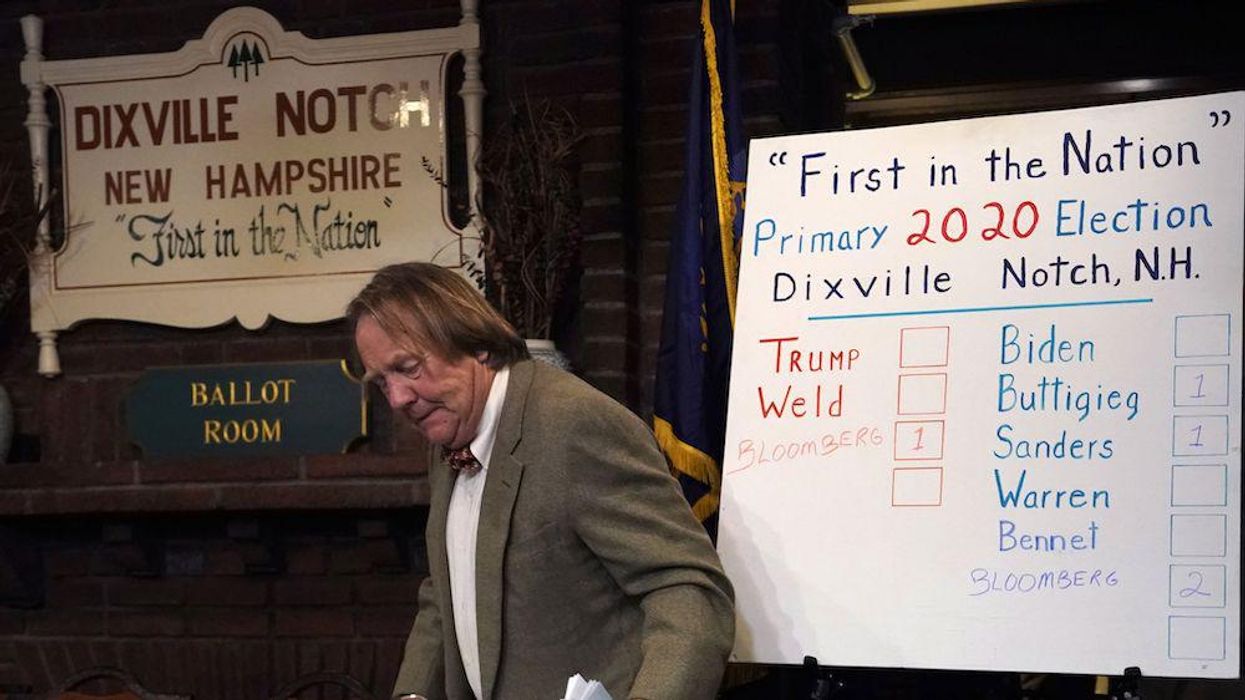
Photo by TIMOTHY A. CLARY/AFP via Getty Images

Two small states have long prided themselves on their quadrennial first-in-the-nation presidential caucus and primary statuses.
Iowans love to brag about their "Hawkeye Cauci" — the first votes cast in the nomination process. The state's spot on the election calendar gets nearly every Democratic and Republican candidate to make an appearance in the state and brings Iowa outsized media love during bleak winter months. Political and government leaders revel in the extra attention the caucuses bring (well, most years — 2020 was a notorious disaster).
New Hampshire loves to brag about being the first primary in the nation — and even has a law requiring that the secretary of state move the election to be at least a week before any other state holds a similar election (Iowa's caucuses don't count).
Now their claims to fame are at risk — all because the Democratic Party believes the states' populations are too white.
The Boston Globe reported that, though Republicans are continuing to give traditional deference to Iowa and New Hampshire — potential 2024 GOP hopefuls have already made trips there — Democrats are debating whether the majority-white small states are worthy of holding the first votes.
According to the Globe, the Democratic National Committee is currently holding behind-the-scenes discussions about what to do about these states. Many Democrats are reportedly saying Iowa and New Hampshire should not get to have the first primary contests because their white populations do not reflect the party's electorate.
Getting in on the action are former Senate Majority Leader Harry Reid (D-Nev.) and House Majority Whip James Clyburn (D-S.C.), who are both pushing to get their states higher up on the schedule list.
Yadira Sanchez, co-executive director of the advocacy group Poder Latinx, echoed those concerns to the Globe: “We definitely see a need for more diversity in states that are scheduled at the beginning of the election, to properly reflect the racial and ethnic diversity of our country, but also [because] it impacts the issues that are being discussed."
"Our diversity," she added, "demands that we see ourselves reflected in the primary process — and not at the end, when decisions have already been made."
Many New Hampshirites — including several Democrats — are pushing back against the idea of race-based voting.
Bill Shaheen, a New Hampshire Democratic national committeeman and husband of Democratic U.S. Sen. Jeanne Shaheen, is one of those who argues against using skin color to determine the primary schedule.
New Hampshire does a "great job" with its primary, he told the Globe. "We create a level playing field. It doesn't matter what the color of your skin is. We judge people by the content of their character."
Still, some Democrats are willing to attack their own state's white privilege in a fight over primary scheduling. Arnie Arnesen, a New Hampshire radio host and onetime Democratic gubernatorial candidate, told the Globe, "New Hampshire is a white state, it is a rich state, it is an old state, it is a privileged state."
What about that New Hampshire law that the secretary of state must move the election to a date that makes it the first in the nation? The Democrats will have to determine whether it's worth the fight, according to the Globe:
New Hampshire state law dictates that it must hold the nation's first primary, but the national parties set the primary calendar for states. More than a decade ago, when Florida and Michigan did not follow the Democratic Party's calendar, they were penalized at the convention by having the voting power of their delegates limited.
If New Hampshire rejected a later spot in the calendar, and the national party stripped its delegates' power, presidential candidates would have to decide whether it was worth coming to the state just for a symbolic victory and some maple syrup.
“New Hampshire has never been about the delegates," said Dante Scala, a political science professor at the University of New Hampshire. “It's been about the publicity that winning here means for a candidate. Would candidates be willing to give that up? That becomes the question."